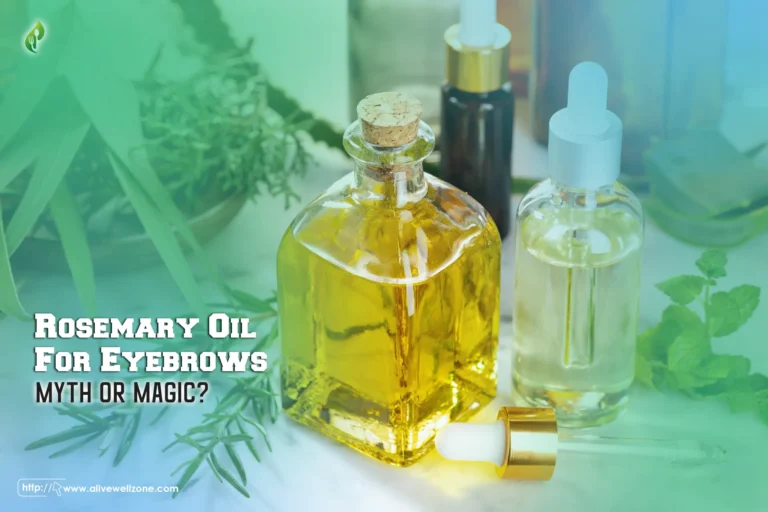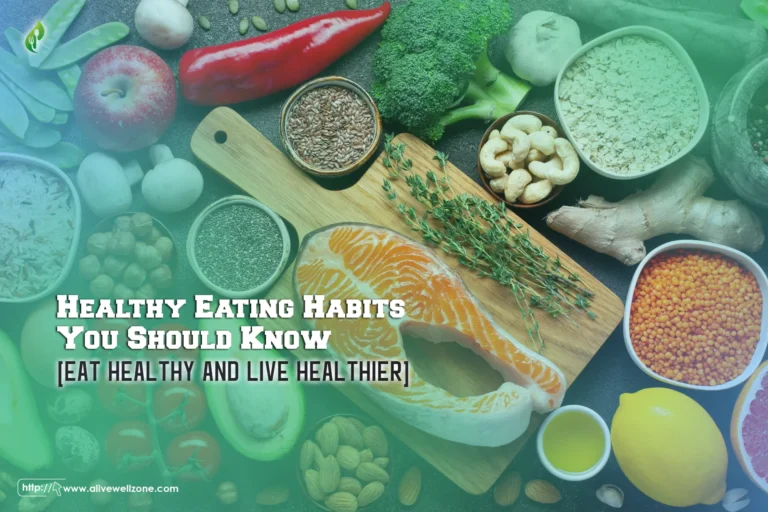
Last Updated on November 22, 2024 by Helena Akter
It can be hard to tell the difference between herbal tea and black tea. In fact, many tea drinkers don’t realize what benefits each type offers because they don’t know how they’re different.
Well, black tea and herbal tea differ in key ways —
- Black tea comes from the Camellia sinensis plant, contains caffeine, and requires 3 to 5 minutes brewing at 200 to 212°F.
- Herbal tea uses herbs or flowers, is caffeine-free, and needs 5 to 7 minutes at 190°F.
In addition, you’ll know about where they come from, what they’re good for, and how they can fit into your daily life. We’ll help you choose the right tea for you, based on what you like and what you need.
Key Takeaways
- Tea Types and Origins: Black tea is made from the Camellia sinensis plant, with six main types: black, green, oolong, white, dark tea, and pu-erh. Herbal teas, though often called “tea,” are not true teas as they don’t come from this plant.
- Black vs. Herbal Tea: Black tea contains moderate caffeine and has a bold, rich flavor due to full oxidation. Herbal teas are naturally caffeine-free and made from different herbs, flowers, or fruits to offer a variety of calming flavors.
- Processing Differences: Black tea undergoes full oxidation, giving it a long shelf life and strong taste. Herbal teas are air-dried or gently heated, preserving their natural flavors.
What is Tea?
Tea is a beverage made by soaking dried leaves from the Camellia sinensis plant in hot water. There are six main types —
- Black
- Green
- Oolong (Wulong)
- White
- Dark tea
- Puer (pu-erh)
Originally from Southeast Asia, this plant is now grown in many places with the right conditions, such as India, China, Sri Lanka, Kenya, and Turkey.
According to legend, tea was first discovered in China when a leaf accidentally fell into an Emperor’s cup of hot water. For centuries, China was the only country producing tea! However, today, more than 40 countries cultivate it.
Now, herbal drinks like chamomile, ginger, and peppermint are often called tea. However, technically, they aren’t true teas since they don’t come from the Camellia sinensis plant.
What is Black Tea?
Black tea, also known as “red tea” in China because of its reddish color when brewed, comes from fully oxidized leaves of the Camellia sinensis plant. Interestingly, The Tea Association of the U.S.A. says that 84% of people drank black tea in the United States in 2021. [1]
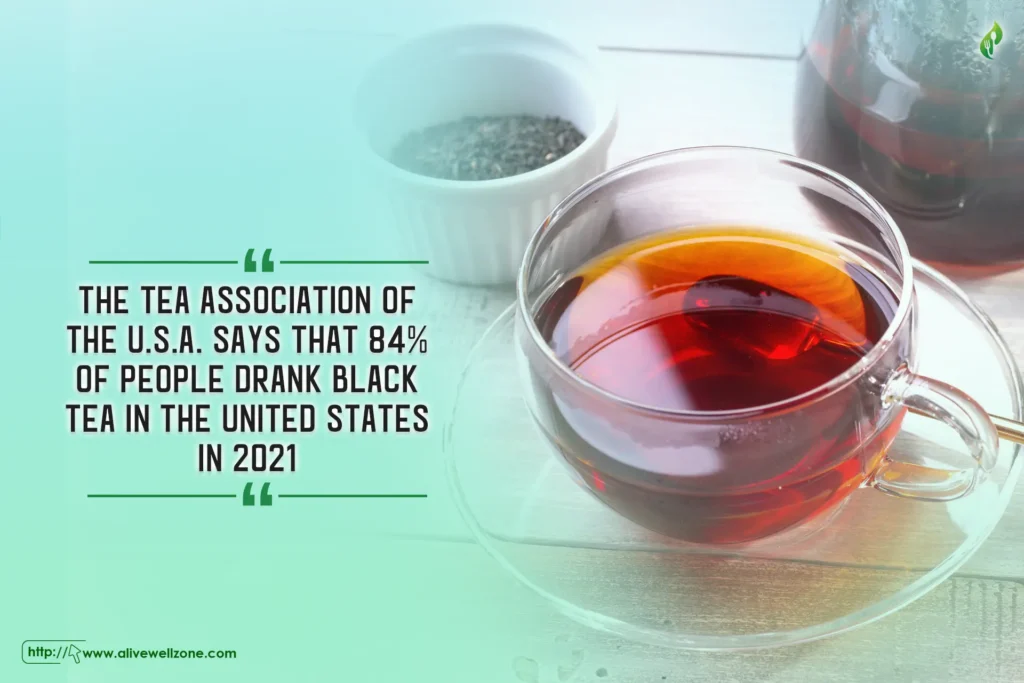
There are two main types of this plant —
- Camellia sinensis: It has small leaves and is mainly grown in China.
- Camellia sinensis assamica: It has larger leaves and is common in India and Sri Lanka.
During the production of black tea, the leaves go through several steps: withering, rolling, oxidation, and drying. This process gives black tea its deep color and strong, rich flavor. And it’s often described as malty with notes of dark chocolate or dried fruit.
Popular types of black tea include Darjeeling, Assam, and Ceylon.
What is Herbal Tea?
Herbal tea, also known as a tisane, is not technically tea since it doesn’t come from the Camellia sinensis plant. Instead, it’s made by soaking different dried or fresh flowers, herbs, and even spices in hot water.
In fact, in a list of herbal teas, you’ll get endless variations including chamomile, lavender, peppermint, barley, ginger, etc. Each of them offers its own flavor based on the ingredients used.
Some herbal blends might use real tea leaves along with herbs, creating what’s called an herbal infusion. However, these still maintain their unique, non-caffeinated characteristics.
Look, herbal teas are known for being calming and may have health benefits. They’re a tasty and relaxing choice compared to regular tea.
Black Tea vs Herbal Tea: A Quick Comparison Table
Here’s a quick comparison of their key attributes to help you choose the right tea for your preference.
| Attributes | Black Tea | Herbal Tea |
| Source | Camellia sinensis plant | Herbs, flowers, fruits |
| Caffeine | Moderate caffeine (40 to 70 mg) | Naturally caffeine-free |
| Processing | Fully oxidized | Air-dried or gently heated |
| Flavor Profile | Bold, malty, earthy | Floral, fruity, spicy |
| Health Benefits | Antioxidants increase energy | Relaxation, medicinal properties |
| Brewing Time | 3 to 5 minutes | 5 to 7 minutes |
| Temperature | Boiling water (200-212°F) | Slightly lower temperature (190°F) |
| Shelf Life | Longer due to oxidation | Shorter, depends on ingredients |
| Varieties | English Breakfast, Earl Grey, Assam, Darjeeling | Chamomile, peppermint, hibiscus, rooibos, and many others |
Herbal Tea vs Black Tea: In-Depth Comparison
When it comes to the difference between black and herbal tea, they go beyond just taste. Here’s how they compare in terms of origin, processing, caffeine content, flavor, and health benefits.
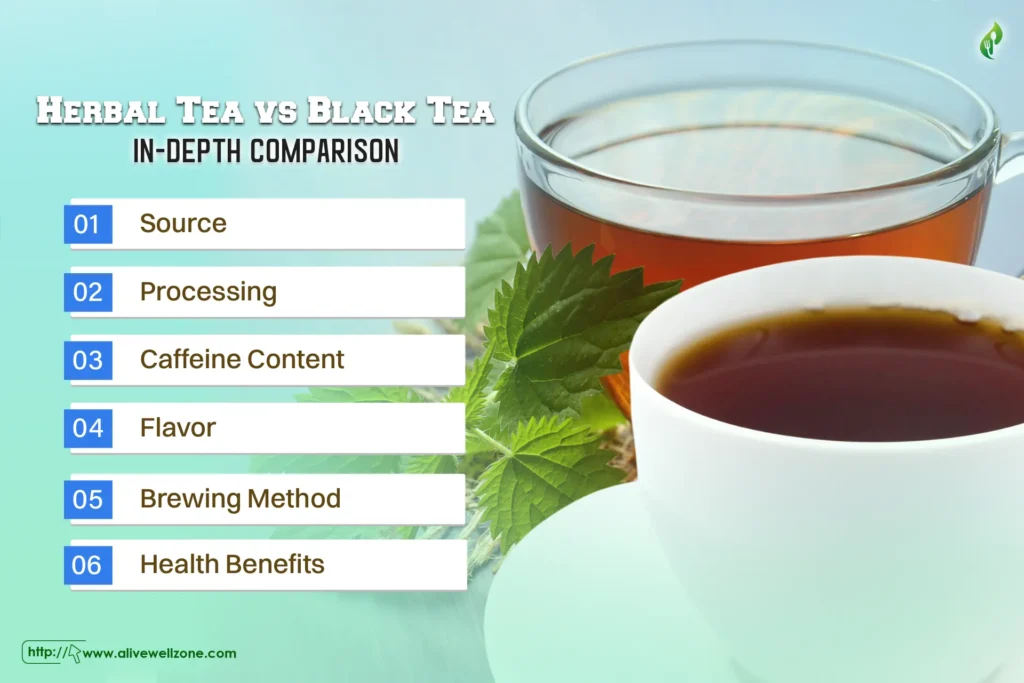
Source
The source of both herbal and black teas significantly shapes their composition and health benefits.
Herbal Tea
Herbal tea is made from a mix of plants, herbs, fruits, and spices, rather than tea leaves. You can make it using versatile ingredients like sage, mint, dandelion, chamomile flowers, and dried fruit peels. Since herbal teas are made from various plants, they can have different health benefits.
Black Tea
Black tea comes from the Camellia sinensis plant and its flavor changes depending on where it’s grown. For example, Darjeeling has a lighter, more floral flavor while Assam black tea is known for its rich, malty taste. These regional differences give black tea its unique variety in taste and health benefits.
Processing
The way herbal and black teas are processed greatly impacts their taste, nutritional content, and shelf life.
Herbal Tea
Herbal teas go through very little processing. Once harvested, the herbs, flowers, and fruits are dried to maintain their natural qualities. Since no oxidation takes place, the teas keep the fresh flavors and benefits of the plants. This simple process helps preserve the essential oils and nutrients.
Hence, you get a more natural and pure taste.
Black Tea
Black tea goes through full oxidation. After the leaves are picked, they’re withered, oxidized, rolled, and dried. In fact, oxidation is key to turning the leaves dark and deepening their flavor.
It also increases tannins, which give black tea its strong, bold taste. This process helps tea stay fresh for longer, unlike less oxidized teas like green tea.
Caffeine Content
Black tea contains moderate levels of caffeine, typically ranging from 40 to 70 mg per 8-ounce cup. Well, it also depends on the steeping time. In contrast, most herbal teas are caffeine-free.
This affects how and when people drink them.
Herbal Tea
Herbal teas are naturally free of caffeine. That’s what makes them a great option for people who are sensitive to stimulants or want a drink for the evening. Since they don’t include tea leaves, they don’t have the compounds that cause caffeine.
However, some herbal blends that include yerba mate or guayusa may contain caffeine.
Black Tea
A study showed that the amount of caffeine in 1 gram of black tea was between 22 and 28 milligrams.[2] The caffeine in black tea remains unchanged during oxidation. So, it’s a great choice when you need an energy lift, especially in the morning or early afternoon.
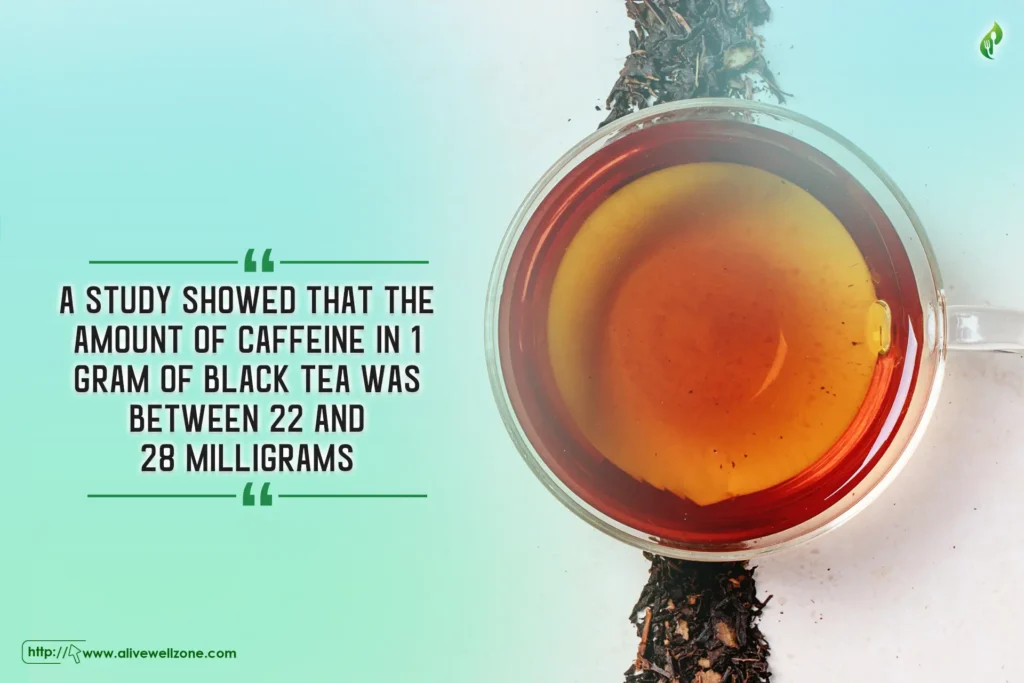
However, if you’re sensitive to caffeine, it’s best to keep an eye on how much you drink.
Flavor
The flavor profiles of black tea and herbal tea are distinctly different due to their sources and processing methods.
Herbal Tea
Herbal teas bring a world of flavors to your cup. You’ll find everything from the gentle floral taste of chamomile to the bright, fruity zing of hibiscus. If you prefer something with a bit of spice, ginger or cinnamon might be your go-to. You can use many different plants to make herbal tea.
Black Tea
You’ll often find black teas to be bold, with deep malty, earthy, or smoky flavors like the Organic English Breakfast Black Tea. Some teas offer a natural sweetness, while others are more astringent, leaving a crisp, dry feel in your mouth.
Plus, Chinese teas like Keemum and Lapsang Souchong bring unique flavors, with hints of cocoa or a smoky pine aroma.
Brewing Method
The way you make herbal and black teas is different. You need to use different temperatures and steep them for different lengths of time. It changes the taste and what you get from the ingredients.
Herbal Tea
Herbal teas are usually brewed at a lower temperature, around 190°F (87°C). Plus, they need more time to steep—about 5 to 7 minutes. This extra time helps the herbs, flowers, and fruits release their full flavors and benefits.
Since herbal teas don’t contain tannins, you can let them steep longer for a strong taste.
Black Tea
Black tea is best brewed with hotter water, around 200-212°F (93-100°C), and steeped for 3 to 5 minutes. Be careful not to over-steep, as it can lead to bitterness due to the tannins in the tea. To get the best flavor, stick to the recommended steeping time.
You can also adjust the strength of your tea by changing the amount of leaves or the steeping time
Health Benefits
Both herbal and black teas offer unique health benefits, but they differ in their primary effects.
Herbal Tea
There are many health benefits of herbal teas. Mainly, the benefits depend on the herbs they contain. For example —
- Chamomile tea helps people relax and sleep better.
- Ginger can ease indigestion.
- Rosehip tea can help with joint pain.
Recently, Maryland University of Integrative Health’s Herbal Dispensary introduced two blends: Survival Tea and Serene Night Tea. Not only do they taste great, but they also offer helpful benefits for navigating the winter season. [3]
Black Tea
Black tea is packed with antioxidants like catechins and theaflavins. They can help improve heart health by lowering cholesterol and improving blood circulation. Plus, a big study found that for every cup of tea you drank each day, you were less likely to die from heart disease by 4%. [4]
Is Black Tea Considered Herbal Tea?
No, black tea isn’t considered herbal tea. Black tea is made from the Camellia sinensis plant, where the leaves are fully oxidized. That’s why it gives a strong, rich flavor and dark color.
In contrast, herbal teas also known as tisanes are made from herbs, flowers, fruits, or spices, and don’t contain tea leaves. Herbal teas are naturally caffeine-free, while black tea has moderate caffeine content.
The main difference is that black tea comes from one kind of plant, while herbal teas are made from a mix of plants. Each plant has a different taste and can be good for your health.
Wrapping Up: Difference Between Herbal Tea And Black Tea
In summary, the key difference between herbal tea and black tea lies in their source, caffeine content, and flavor. Black tea has been around for a long time and has a strong, malty taste. Herbal tea is made from different herbs, which means there are many different kinds.
When deciding between black tea and herbal tea, think about what you want. Black tea gives you energy, while herbal tea is calming. Both have their own special tastes and benefits for your health.
FAQs
Can you drink black tea or herbal tea during breastfeeding or pregnancy?
You can drink black tea in moderation during pregnancy or breastfeeding, as it contains caffeine. However, be cautious with herbal teas, as certain herbs may not be safe. Always consult your healthcare provider for guidance on what’s best for you.
Can black tea or herbal tea help with weight loss?
Yes, both black tea and herbal tea can support weight loss. Black tea has caffeine that speeds up your metabolism, while green tea has catechins that help burn fat. Drinking these teas as part of a healthy diet can help you reach your weight loss goals.
Is it okay to drink black tea every day?
Yes, it’s generally safe to drink black tea daily in moderation. Up to 4 cups a day is considered safe for most people. But drinking more than four cups a day could be harmful, so it’s best to limit how much you drink to stay healthy.

